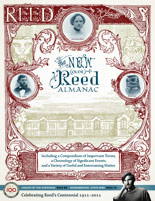
IRIS login | Reed College home Volume 90, No. 4: December 2011
(Not so) Retiring Professors
Peter Russell : The Gene Genie
[Biology, 1972–2011]
By Romel Hernandez
Peter Russell has never been content to do things by half measures. After 39 years of teaching at Reed with boundless verve, he intends to enjoy retirement in the same spirit, riding his horses, Nike and Dante, racing his bicycle, playing guitar with the Fabulous Fender Benders, and writing new editions of his college textbooks.
“I don’t really have a problem letting go,” he says of adjusting to emeritus existence. “I have too many things I can do.”
Peter has left a lasting legacy in Reed’s biology department, where he was a prodigious genetics researcher (most recently conducting experiments studying plant virus gene expression in yeast). He has won numerous grants from the National Institutes of Health and the National Science Foundation and raised the profile of scientific research at smaller liberal arts institutions as past president of the biology division of the Council on Undergraduate Research. He has also written, and continues to update, a bestselling genetics textbook that has gone through eight editions and been published in Greek and Italian, and co-written an introductory biology text. Needless to say, he has earned a reputation around campus as the Man Who Never Sleeps.
“I’ve always set high standards,” says Peter, who attributes his ethic to his working-class upbringing in Gillingham, England. His parents encouraged him to attend the University of Sussex, after which he crossed the pond for graduate school at Cornell.
When Peter arrived at Reed, he joined a department with a top-notch reputation for rigorous, relevant research. He was instrumental in taking the department to new heights as an “extraordinarily active researcher,” says fellow geneticist Janis Shampay [biology 1990–]. When Shampay first joined the faculty, any concerns she had about whether she would be able to pursue “hardcore research” were allayed the first time she walked into Peter’s lab—“chock full of equipment, large and small: centrifuges, ultracentrifuges, microcentrifuges, incubators, shakers, ovens, freezers, waterbaths, supplies, reagents, tubes, pipettors, pipet tips, and a freezer full of every enzyme sold by New England Biolabs. Needless to say, I was pretty well set up.”
But Peter’s greatest mark has been as a teacher, mentor, and friend to generations of Reedies who came to know him as a demanding but considerate professor who cared deeply about how his students were doing both inside and outside the lab.
“We were family members—that was just the way it was, and it was very comforting,” says Katrin Talbot ’80. She recalled that when her own daughter, Ariana Karp ’11, arrived as a new student at Reed, “Peter threw his arms around her and said, ‘You’re Katrin’s girl!’”
Peter treated his students as junior colleagues in the lab, supervising a remarkable 128 theses and coauthoring numerous journal articles with students.
“I’ve always given students tough love,” Peter says. “You’ve got to challenge the students so they learn to their maximum potential . . . You want to make them think.”
“Peter had really high standards—his genetics course was tough,” says David Fastovsky ’77. “And even though it was always clear that he was the professor and you were the student, he was willing to hang out with us, too. “
In the late ’70s, Peter formed a Reed band, Peter J. Ribosome and the Subunits, which went through several lineups (David and Katrin were early bandmates). The group was best known for a rollicking version of “Roll Over Beethoven” that would have made both Chuck Berry and Gregor Mendel proud. Here’s the chorus:
Well if you feel and like it you get your genome and
reel and rock and roll it over and
move on up just one codon farther and
reel and rock and roll it over.
Got that old central dogma of nuclear DNA.
We suspect Peter will keep reeling and rocking for many more years to come.


LATEST COMMENTS
steve-jobs-1976 I knew Steve Jobs when he was on the second floor of Quincy. (Fall...
Utnapishtim - 2 weeks ago
Prof. Mason Drukman [political science 1964–70] This is gold, pure gold. God bless, Prof. Drukman.
puredog - 1 month ago
virginia-davis-1965 Such a good friend & compatriot in the day of Satyricon...
czarchasm - 4 months ago
John Peara Baba 1990 John died of a broken heart from losing his mom and then his...
kodachrome - 7 months ago
Carol Sawyer 1962 Who wrote this obit? I'm writing something about Carol Sawyer...
MsLaurie Pepper - 8 months ago
William W. Wissman MAT 1969 ...and THREE sisters. Sabra, the oldest, Mary, the middle, and...
riclf - 10 months ago